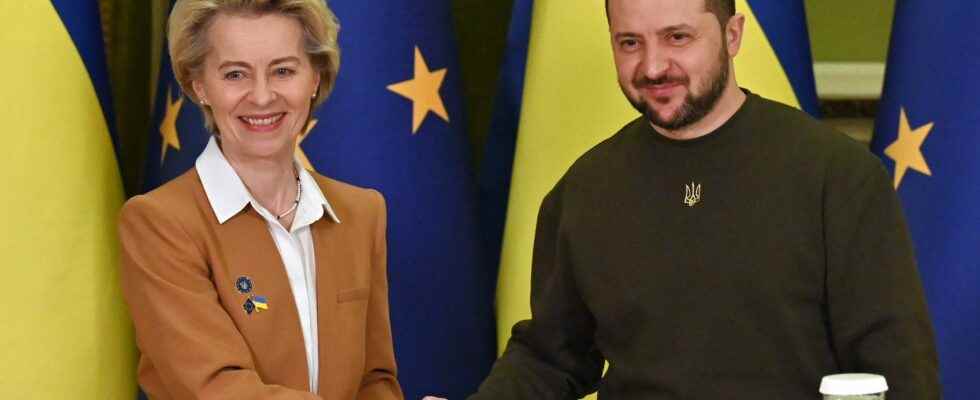It is an unprecedented summit in a country at war. More than half of the European Commission traveled to Ukraine on Thursday February 2, in addition to President Ursula Von der Leyen and President of the European Council Charles Michel. But for the 27, the summit meeting with President Volodymyr Zelensky is also about “expectations management”. Faced with Ukrainians who are working overtime to accelerate their march towards integration, the European Union is trying to temporize while finding words of encouragement. “They are going to talk to us about ‘membership’, we are going to answer them ‘reconciliation'”, deciphers a European diplomat.
Kyiv secured the coveted candidate country status in record time last June. But to formally launch negotiations for their future membership, the Ukrainians must meet seven prior conditions linked in particular to the rule of law and the fight against corruption. On the eve of the arrival of representatives of community institutions, a wave of arrests and searches targeted administrations and officials, in connection with a corruption scandal concerning military supplies. A way for the kyiv government to show that it is taking the problem head-on. In an interview granted Thursday, February 2 to the German weekly Der Spiegel, the Ukrainian Prime Minister sets the horizon for the end of the year for the opening of accession negotiations. “Our ambition is to be formally ready to join at the end of 2024. The decision will no longer be ours at that time, but we will do everything to be ready”, explains Denys Schymal again.
But the Europeans do not have the same timetable in mind, for lack of consensus between the 27 to skip the stages. “France and the Netherlands in particular are not ready to step up the tempo,” explains a senior European official. No concrete announcements are expected at the summit, Ukraine’s progress will be informally assessed in the spring before a fuller report at the annual enlargement update, which each fall assesses the efforts of all candidate countries to join the EU. ‘European Union. “Not a day goes by that we don’t talk to the Ukrainians about their progress and their reforms, the final declaration of the summit will mention them, but we will apply the same methodology to them as to the others”, argues a source Brussels.
The dilemma of Europeans
In reality, the 27 are caught in a dilemma. “If we make the Ukrainians wait 25 years, we will lose them. But if we bring them in too quickly, we will lose ourselves.” explains an official from a member country, who points out the significant gap between kyiv and the 27 on respect for the rule of law and on the level of the economy. Not all capitals are ready for an upheaval in internal balances either. The risk of the EU’s center of gravity shifting towards the East worries France and elsewhere. “In Portugal, there is a tension between solidarity vis-à-vis Ukraine and national interests, analyzes Livia Franco, professor at the Catholic University of Portugal. Lisbon cannot help thinking that membership of Ukraine would intensify the peripheral side of the country. A price that the Portuguese are not ready to pay in the near future”.
So in the meantime, the 27 are betting on strong words. “I cherish the hope that one day, soon I hope, a Ukrainian or a Ukrainian will occupy my current post of President of the European Council, or that of President of the European Parliament, or of the Commission”, thus launched Charles Michel in front of Ukrainian parliamentarians during his previous visit to kyiv on January 19.
The Europeans also highlight their unfailing support: 60 billion euros have already been spent or budgeted for Ukraine this year. Finally, they provide for a deepening of economic cooperation, based on the association agreement signed in 2017 which opens up the field of possibilities, for example in financial services, energy, exemptions from customs duties or by putting in place an agreement on telephone roaming. They could also decide to increase the number of experts responsible for supporting kyiv in its march towards the EU.
